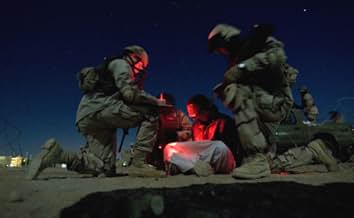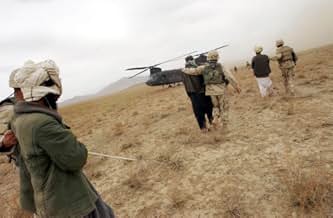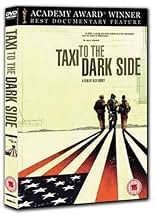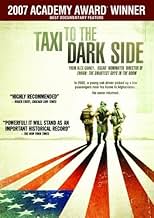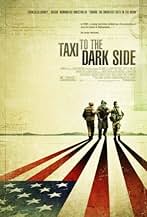VALUTAZIONE IMDb
7,5/10
17.284
LA TUA VALUTAZIONE
Aggiungi una trama nella tua linguaAlex Gibney exposes the haunting details of the USA's torture and interrogation practices during the War in Afghanistan.Alex Gibney exposes the haunting details of the USA's torture and interrogation practices during the War in Afghanistan.Alex Gibney exposes the haunting details of the USA's torture and interrogation practices during the War in Afghanistan.
- Regia
- Sceneggiatura
- Star
- Vincitore di 1 Oscar
- 10 vittorie e 5 candidature totali
Alex Gibney
- Narrator
- (voce)
Moazzam Begg
- Self - Torture Victim
- (as Moazzam Beg)
George W. Bush
- Self
- (filmato d'archivio)
Jack Cafferty
- Self
- (filmato d'archivio)
Dick Cheney
- Self
- (filmato d'archivio)
Lynndie England
- Self
- (filmato d'archivio)
Tommy Franks
- Self - General
- (filmato d'archivio)
Recensioni in evidenza
Taxi to the Dark Side doesn't contain anything wholly new, just more complete detail and important clarifications, such as the fact that Guantanamo uses very much the same basic methods to Abu Ghraib, though the location is cleaner and of course was not formerly used by Saddam Hussein. Dilawar, the Afghan taxi driver, was essentially beaten to death by American soldiers in the Bagram prison. He did not live long once his ill-trained but plainly-directed captors got hold of him, but his final hours were terrifying and horrible. They kicked his legs till they turned to pulp and would have had to be amputated, had he lived. A heart condition caused an embolism that went to his brain and was the cause of death, which on the official US papers given to Dilawar's family, in English so they did not know what they meant, was "homicide," but the officer in charge of the prison denied this when queried. Gibney, who was responsible previously for the documentary Enron: The Smartest Guys in the Room, presents interviews with some of the American soldiers responsible for Dilawar's death. They were, of course, only following orders. Other talking heads clarify the fact that the "gloves are off" policy by US authorities following 9/11/01 goes back to Cheney, approved by Bush, carried out with gusto by Rumsfeld, and sent directly down the line to the low-ranking and inexperienced people whose behavior after the Abu Ghraib scandal emerged was claimed by authorities to be that of people on the "night shift" or "a few bad apples." This film thoroughly disproves that claim.
Gibney shows how the US administration has become willing to blatantly disregard the rule of law, domestic as well as international, to fight their "war on terror" in ways that involved extreme cruelty and murder. In doing this they had the assistance of various corrupt or immoral--or, if you prefer, simply very misguided--men of the law and the judiciary.
The practices have been illegal. They may also have been variously unwise. The photos of Americans mistreating Muslim prisoners at Abu Ghraib are good recruiting material for anti-US terrorists. But torture also simply doesn't work, accomplishes nothing useful. Much time is given to Alfred McCoy, author of a book called 'The Question of Torture' and a professor of history at the University of Wisconsin. McCoy recounts that the CIA has been working on methods of coercion for all the decades of its existence, but their experiments have yielded little except lawsuits from victimized guinea pigs. Another authority, a former CIA operative, asserts that the best method to obtain information is to gain the confidence of the prisoner and convince him you can help him.
But post 9/11 "high value" prisoners were clearly tortured with anything their captors could think of--and then confessed to anything they could think of. The film clarifies that psychological experiments by Donald Hobb at McGill University in the Seventies proved sensory deprivation is the most effective means of torture; at least according to Hobb it can induce psychosis within 48 hours. The film shows that basically all "terrorism" suspects here and abroad have been subjected to sensory deprivation. That is what covering the ears, head, and hands does; and it was and is standard treatment to continue this for hours and days. This is more effective than pain. But effective at doing what? Breaking down the prisoner, not obtaining reliable information, or any information, for that matter.
Hence the widely spread US policies are not only harmful, dangerous, immoral, and illegal, but stupid and, in intelligence-gathering terms, worthless.
The "extraordinary rendition," waterboarding, sensory deprivation, etc. don't work in practical terms, but they have a political purpose. They convince people that the US is "getting tough" on its enemies. But the US has not been holding real enemies. If it were, the useless prisoners or wrongly captured would be filtered out, as Dilawar ought to have been. He was innocent. And now the US authorities are in a bad position. They cannot acquit even those few Guantanamo prisoners they are putting up for show trials, because to do so would reveal that they had been held for six years for no reason. That would look bad. Varieties of Orwellian terminology have been devised to describe these prisoners. The film also shows "tours" of Guantanamo and deflates the claims of the tour guides.
One reason for all this is who's been in charge: a group of draft dodgers who never served in a war. Senator McCain is shown in the film as a man who opposes torture for good reason: because he experienced it during his years in a North Vietnam prison.
Another issue: American has a developed a culture of guilty-as-charged, of hysterical attacks on imagined enemies. An example: the popular jingoistic TV program "24," starring Kiefer Sutherland as a CIA agent who "saves" millions by torturing mad terrorists with ticking bombs in Times Square. A Dark Side talking head says that there has never been such a person captured, and suggests that if there were, such a person would have the commitment to die rather than reveal information about his plot.
I do not know if torture never gets you information, though the assertion that insinuating oneself into the confidence of a prisoner is more effective makes sense. What is clear enough from Gibney's powerful and disturbing film (which contains many images not for the squeamish) is that the torture and wrongful imprisonment and lawlessness of the US as a nation post-9/11 indicate a country that has become very cruel and very stupid.
Andrew O'Hehir of Salon.com recounts that at a post-screening Q&A when Gibney was asked what he would like his film to accomplish, he said "I hope it provokes some rage." "Well," says O'Hehir, "it worked on me." May it work on everyone who sees it.
Gibney shows how the US administration has become willing to blatantly disregard the rule of law, domestic as well as international, to fight their "war on terror" in ways that involved extreme cruelty and murder. In doing this they had the assistance of various corrupt or immoral--or, if you prefer, simply very misguided--men of the law and the judiciary.
The practices have been illegal. They may also have been variously unwise. The photos of Americans mistreating Muslim prisoners at Abu Ghraib are good recruiting material for anti-US terrorists. But torture also simply doesn't work, accomplishes nothing useful. Much time is given to Alfred McCoy, author of a book called 'The Question of Torture' and a professor of history at the University of Wisconsin. McCoy recounts that the CIA has been working on methods of coercion for all the decades of its existence, but their experiments have yielded little except lawsuits from victimized guinea pigs. Another authority, a former CIA operative, asserts that the best method to obtain information is to gain the confidence of the prisoner and convince him you can help him.
But post 9/11 "high value" prisoners were clearly tortured with anything their captors could think of--and then confessed to anything they could think of. The film clarifies that psychological experiments by Donald Hobb at McGill University in the Seventies proved sensory deprivation is the most effective means of torture; at least according to Hobb it can induce psychosis within 48 hours. The film shows that basically all "terrorism" suspects here and abroad have been subjected to sensory deprivation. That is what covering the ears, head, and hands does; and it was and is standard treatment to continue this for hours and days. This is more effective than pain. But effective at doing what? Breaking down the prisoner, not obtaining reliable information, or any information, for that matter.
Hence the widely spread US policies are not only harmful, dangerous, immoral, and illegal, but stupid and, in intelligence-gathering terms, worthless.
The "extraordinary rendition," waterboarding, sensory deprivation, etc. don't work in practical terms, but they have a political purpose. They convince people that the US is "getting tough" on its enemies. But the US has not been holding real enemies. If it were, the useless prisoners or wrongly captured would be filtered out, as Dilawar ought to have been. He was innocent. And now the US authorities are in a bad position. They cannot acquit even those few Guantanamo prisoners they are putting up for show trials, because to do so would reveal that they had been held for six years for no reason. That would look bad. Varieties of Orwellian terminology have been devised to describe these prisoners. The film also shows "tours" of Guantanamo and deflates the claims of the tour guides.
One reason for all this is who's been in charge: a group of draft dodgers who never served in a war. Senator McCain is shown in the film as a man who opposes torture for good reason: because he experienced it during his years in a North Vietnam prison.
Another issue: American has a developed a culture of guilty-as-charged, of hysterical attacks on imagined enemies. An example: the popular jingoistic TV program "24," starring Kiefer Sutherland as a CIA agent who "saves" millions by torturing mad terrorists with ticking bombs in Times Square. A Dark Side talking head says that there has never been such a person captured, and suggests that if there were, such a person would have the commitment to die rather than reveal information about his plot.
I do not know if torture never gets you information, though the assertion that insinuating oneself into the confidence of a prisoner is more effective makes sense. What is clear enough from Gibney's powerful and disturbing film (which contains many images not for the squeamish) is that the torture and wrongful imprisonment and lawlessness of the US as a nation post-9/11 indicate a country that has become very cruel and very stupid.
Andrew O'Hehir of Salon.com recounts that at a post-screening Q&A when Gibney was asked what he would like his film to accomplish, he said "I hope it provokes some rage." "Well," says O'Hehir, "it worked on me." May it work on everyone who sees it.
This horrifying documentary won the Oscar for 2007. Using the case of an innocent Afghan taxi driver who were tortured to death by American interrogators in Bagram prison as the starting point, the film chronicles the atrocities committed by the Bush administration in the name of American people and an ill-defined 'war on terror'.
The film is written, directed and narrated by Alex Gibney, son of a high-ranking naval officer who was an interrogator in World War II. A great American and a true patriot, Frank Gibney's final disappointment of what became of the great nation of the United States in the hands of a few liars is heart-wrenching.
There is not a single frame in the film that is not supported by hard evidence. All of the investigation was conducted by Americans whose credentials of decency and patriotism are above suspicion. The film is a chronicle of how paranoia, self-serving deceit and mere stupidity can threaten the very values a great nation was built on. It should be impossible for anyone who watches this meticulous document to ever criticize the veracity of claims put forward by the recent films, Rendition, In the Valley of Elah, or Redacted - flawed as films though that they were.
Every person in the world, especially every American, that cares about the true nature of freedom and the sanctity of the individual (the basic tenets on which America was built) should see this film. How could anyone claim that it would be loved only by the supporters of Taliban is beyond me.
The film is written, directed and narrated by Alex Gibney, son of a high-ranking naval officer who was an interrogator in World War II. A great American and a true patriot, Frank Gibney's final disappointment of what became of the great nation of the United States in the hands of a few liars is heart-wrenching.
There is not a single frame in the film that is not supported by hard evidence. All of the investigation was conducted by Americans whose credentials of decency and patriotism are above suspicion. The film is a chronicle of how paranoia, self-serving deceit and mere stupidity can threaten the very values a great nation was built on. It should be impossible for anyone who watches this meticulous document to ever criticize the veracity of claims put forward by the recent films, Rendition, In the Valley of Elah, or Redacted - flawed as films though that they were.
Every person in the world, especially every American, that cares about the true nature of freedom and the sanctity of the individual (the basic tenets on which America was built) should see this film. How could anyone claim that it would be loved only by the supporters of Taliban is beyond me.
9imxo
There is something you need to know about this film: it is not about real insurgents or terrorists or about real soldiers, and it is certainly not an anti-American film.
It is about how senior military and civilian officials demand results from their subordinates, even if the results are to be obtained by unconscionable, immoral, and illegal means, up to, and including, torture and murder. The fact that many of these results - what the military like to call "the mission" - are faked or just wrong is of no particular concern to them. Naturally, you'll never find a document signed by any of those officials advocating torture and murder. The most you'll ever find is a reference to "enhanced interrogation techniques" (i.e., torture). And if a detainee dies, the senior officers and officials always benefit from "plausible deniability" and claim that it must be the fault of junior "bad apple" troops. If terrorists are murderers, some of our own troops have certainly engaged in murder, too. To reveal this is not anti-American; it's just a simple fact. Because the troops often do it in a group they think they're not murderers. Just as, I imagine, someone who participates in gang rape does not consider himself, individually, to be a rapist.
While most Military Police (MP) troops are fighting hard on the ground every day in Iraq and Afghanistan, one group of troops which this film examines are those Military Police who are used as prison guards. The other troops examined in the film are some military intelligence ("MI") troops employed as interrogators in prison camps.
If you don't know already, Military Police are usually despised by their own troops. If you give a soldier special power over his fellow soldiers he will often abuse it. I still recall an Australian friend of mine mentioning that many of the Aussie "Red Hats" (MPs) who sailed for home after WWII never made it back; their fellow troops threw them overboard.
The old saw about military intelligence being a contradiction in terms is never more apparent than in the case of interrogators. When you hear the word intelligence here you must forget all about spies, codes, and the stuff of James Bond novels. The interrogators of MI are an example of soldiers who are ill prepared, in general, to carry out work that would normally take years to master. They are mostly low-ranking enlisted men and women, privates and sergeants, almost none of whom speak with any proficiency the language of the detainees they're interrogating.
So, imagine the scenario: senior officials demanding intelligence, no matter how it's obtained; unqualified interrogators using whatever means they can think of to satisfy their superiors' demands; and MP prison guards who have the power of life and death over their detainees, with almost no restrictions on what they can do to them. Behind all this is the unwritten understanding that if something goes wrong, the troops will probably not be prosecuted. God help the innocent person swept up into this sadistic, bureaucratic system. But as we all know, if you've been arrested, you must be guilty. Right?
The elephant in the closet in all this is the Central Intelligence Agency, an organization that regards itself as above law, morality, and civilized behavior. It gets away with much of what it does by having the military, foreigners, and contractors to do its dirty work for it. And when somebody has to take a fall, well, that's what privates and sergeants are for. If your kids are MPs, interrogators, or just in the military, advise them always to watch their backs around those people.
This may be a disturbing film for civilians, but it won't include many surprises if you've served in the armed forces, or on a police force, or in a prison. Those are the people who know about this, but they're not about to tell you. No wander the USA has pulled out of the War Crimes Treaty. But what officials do not want to admit, even to themselves, is that war crimes are war crimes, no matter if you're a treaty signatory or not.
It is about how senior military and civilian officials demand results from their subordinates, even if the results are to be obtained by unconscionable, immoral, and illegal means, up to, and including, torture and murder. The fact that many of these results - what the military like to call "the mission" - are faked or just wrong is of no particular concern to them. Naturally, you'll never find a document signed by any of those officials advocating torture and murder. The most you'll ever find is a reference to "enhanced interrogation techniques" (i.e., torture). And if a detainee dies, the senior officers and officials always benefit from "plausible deniability" and claim that it must be the fault of junior "bad apple" troops. If terrorists are murderers, some of our own troops have certainly engaged in murder, too. To reveal this is not anti-American; it's just a simple fact. Because the troops often do it in a group they think they're not murderers. Just as, I imagine, someone who participates in gang rape does not consider himself, individually, to be a rapist.
While most Military Police (MP) troops are fighting hard on the ground every day in Iraq and Afghanistan, one group of troops which this film examines are those Military Police who are used as prison guards. The other troops examined in the film are some military intelligence ("MI") troops employed as interrogators in prison camps.
If you don't know already, Military Police are usually despised by their own troops. If you give a soldier special power over his fellow soldiers he will often abuse it. I still recall an Australian friend of mine mentioning that many of the Aussie "Red Hats" (MPs) who sailed for home after WWII never made it back; their fellow troops threw them overboard.
The old saw about military intelligence being a contradiction in terms is never more apparent than in the case of interrogators. When you hear the word intelligence here you must forget all about spies, codes, and the stuff of James Bond novels. The interrogators of MI are an example of soldiers who are ill prepared, in general, to carry out work that would normally take years to master. They are mostly low-ranking enlisted men and women, privates and sergeants, almost none of whom speak with any proficiency the language of the detainees they're interrogating.
So, imagine the scenario: senior officials demanding intelligence, no matter how it's obtained; unqualified interrogators using whatever means they can think of to satisfy their superiors' demands; and MP prison guards who have the power of life and death over their detainees, with almost no restrictions on what they can do to them. Behind all this is the unwritten understanding that if something goes wrong, the troops will probably not be prosecuted. God help the innocent person swept up into this sadistic, bureaucratic system. But as we all know, if you've been arrested, you must be guilty. Right?
The elephant in the closet in all this is the Central Intelligence Agency, an organization that regards itself as above law, morality, and civilized behavior. It gets away with much of what it does by having the military, foreigners, and contractors to do its dirty work for it. And when somebody has to take a fall, well, that's what privates and sergeants are for. If your kids are MPs, interrogators, or just in the military, advise them always to watch their backs around those people.
This may be a disturbing film for civilians, but it won't include many surprises if you've served in the armed forces, or on a police force, or in a prison. Those are the people who know about this, but they're not about to tell you. No wander the USA has pulled out of the War Crimes Treaty. But what officials do not want to admit, even to themselves, is that war crimes are war crimes, no matter if you're a treaty signatory or not.
Too few have heard of Dilawar. Those who have will probably never forget him. Alex Gibney certainly will not. His latest film starts and ends with this poor innocent taxi driver who, in 2002, was taken to the Bagram airbase in Afghanistan. Five days later, he was dead.
Dilawar's death was the spark which ultimately led to the international awareness of what the Bush administration was doing to its detainees in the war on terror. Gibney's film, however, decides to look up the tree, not down, to discover who was really responsible for these unpleasant developments.
Gibney's film is bolstered by frank and interesting interviews with some of the troops on the ground. Their remorse is clear, as is their disgust. And disgust is the right word. This is, by no means, an easy watch. The use of the appalling footage which has been generated by the recent conflicts is necessary because, if anyone is in any doubt about how morally reprehensible these tactics are, this film will make it abundantly clear.
However, this film's real strength is the structure of its attack on the tactics that are employed. Gibney demonstrates that the tactics used are hopelessly inadequate and never yield effective information. There is a cutting and brilliant comparison with the old techniques and the new where an interviewee, a former FBI interrogator, uses his old tools of interrogation words and you can feel yourself being persuaded.
This is not just a polemic. It is a human story and a powerful and well-constructed argument. It should be essential viewing as what has happened at Guantanamo, Bagram and Abu Ghraib should never be forgotten. This is excellent, important film-making.
4 Stars out of 5
Dilawar's death was the spark which ultimately led to the international awareness of what the Bush administration was doing to its detainees in the war on terror. Gibney's film, however, decides to look up the tree, not down, to discover who was really responsible for these unpleasant developments.
Gibney's film is bolstered by frank and interesting interviews with some of the troops on the ground. Their remorse is clear, as is their disgust. And disgust is the right word. This is, by no means, an easy watch. The use of the appalling footage which has been generated by the recent conflicts is necessary because, if anyone is in any doubt about how morally reprehensible these tactics are, this film will make it abundantly clear.
However, this film's real strength is the structure of its attack on the tactics that are employed. Gibney demonstrates that the tactics used are hopelessly inadequate and never yield effective information. There is a cutting and brilliant comparison with the old techniques and the new where an interviewee, a former FBI interrogator, uses his old tools of interrogation words and you can feel yourself being persuaded.
This is not just a polemic. It is a human story and a powerful and well-constructed argument. It should be essential viewing as what has happened at Guantanamo, Bagram and Abu Ghraib should never be forgotten. This is excellent, important film-making.
4 Stars out of 5
In 2002 taxi driver Dilawar was picked up by US forces with his passengers in the desert and taken to Bagram prison in Afghanistan. Five days later he was dead. Injuries to his legs were compared with those he would have sustained if he had been run over by a truck had he lived it was likely that his legs would have had to have been amputated due to the damage. With this as the starting point, this documentary tells the story of the role of "torture" in the war on terror, from Abu Ghraid to Guantanamo.
Having put Gibney's documentary on Enron as one of my ten favourite films of 2005, I eagerly took up the opportunity the UK (and much of Europe) had to catch this on television ahead of the full release in the US in 2008. Shown as part of the BBC's excellent "Why Democracy" series of films, this one opened with the caption question "can terrorism destroy democracy?". To the casual listener the question appears to be about the ability of terrorists to bring down what we see as Government (ie by crashing planes into it) but really the question in regards this film appears to be more about whether our idea of freedom and democracy can survive the way we fight terrorism. As a result this film is about the use of "torture" against terrorist suspects, specifically focusing on the United States.
The reader may be wondering why the focus (in the title) on Dilawar. Well I did too because he died in Bagram and his story sadly ends there, while the vast majority of the film focuses on the infamous examples of torture and inhumane treatment in the other places. Well it turns out that Dilawar is a device and one that the film uses very well. The morality of the use of torture is not black and white and of course the usual "ticking time bomb" scenario is thrown up; the film does counter this by suggesting that the weekly scenarios in Fox's 24 are not the norm (to say the least) but the best answer to most of the moral questions are simply to refer back to a taxi driver who died after five days in captivity with horrific injuries the film doesn't say he was innocent but it doesn't need to nobody suggests he was evil or a key player either, but yet he is dead. This hangs over the film even though he is not the focus after the first twenty minutes.
What the film does from then on in is paint a picture of lack of respect for humanity, lack of respect for international laws, lack of accountability and lack of transparency. The film plays a clip of Rumsfeld speaking on the (then) allegations of mistreatment and says that it will be looked into so that "the world will see how a free system, a democratic system, functions and operates"; well he was right and it is not pretty viewing. As with Enron, Gibney does betray his politics and the film has very little in the way of even handedness about the debate. This is a little disappointing in regards the debate but the overwhelming nature of the presentation of arrogance and carelessness did make wonder how you would balance these issues certainly the quotes I have heard down the years from politicians have not been able to convince. Certainly a clip of Bush talking about "suspected terrorists" who have died, or as he says "put it this way they're no longer a problem to the United States"; the fact that he acknowledges they are "suspects" rather than convicts but yet sees their death as a good thing says it all.
Considering this issue is everywhere in the media, Gibney does very well to structure his film to build it from the ground up. Not only does he use the words of the Bush administration against them ("the only thing I know for certain is that these are bad people") but he also details the wider political picture beyond the blame that was dumped onto Lynndie England, Charles Graner and others. He does this very well, bringing in the input of John Yoo and the terribly smarmy Alberto Gonzales. Even after the photographs in the paper, seeing the unedited video and hearing firsthand accounts from both sides is shocking and disturbing affair again, how would you set out to "balance" these? Beyond the issue of torture I found the lack of accountability and ownership to be just as shocking as privates are floated down the river while those in charge never face worse than early retirement. The biggest challenge with this material is to keep it as a valid piece of work even as the topic grows daily and that many will be tired of hearing about it just this last week or so we have seen more debate and also the CIA deleting old tapes of interrogations (tapes that Bush has "no recollection" of existing); however Gibney brings the film to a close well, making it feel like something that can stand still and still work the personal touch of his late father's comments at the end (himself a WWII Navy interrogator) talking about how "we" should be different than "them", making for a suitable summing up of why the film is important.
Another strong documentary from Gibney despite the lack of balance and the challenges with the topic. It deserves to be seen by a bigger audience than it has been, even if it won't make the difference it should do. Depressing to think that, decades from now people will look back on this and wonder how on earth we allowed our leaders to do this in our names and let them get away with it.
Having put Gibney's documentary on Enron as one of my ten favourite films of 2005, I eagerly took up the opportunity the UK (and much of Europe) had to catch this on television ahead of the full release in the US in 2008. Shown as part of the BBC's excellent "Why Democracy" series of films, this one opened with the caption question "can terrorism destroy democracy?". To the casual listener the question appears to be about the ability of terrorists to bring down what we see as Government (ie by crashing planes into it) but really the question in regards this film appears to be more about whether our idea of freedom and democracy can survive the way we fight terrorism. As a result this film is about the use of "torture" against terrorist suspects, specifically focusing on the United States.
The reader may be wondering why the focus (in the title) on Dilawar. Well I did too because he died in Bagram and his story sadly ends there, while the vast majority of the film focuses on the infamous examples of torture and inhumane treatment in the other places. Well it turns out that Dilawar is a device and one that the film uses very well. The morality of the use of torture is not black and white and of course the usual "ticking time bomb" scenario is thrown up; the film does counter this by suggesting that the weekly scenarios in Fox's 24 are not the norm (to say the least) but the best answer to most of the moral questions are simply to refer back to a taxi driver who died after five days in captivity with horrific injuries the film doesn't say he was innocent but it doesn't need to nobody suggests he was evil or a key player either, but yet he is dead. This hangs over the film even though he is not the focus after the first twenty minutes.
What the film does from then on in is paint a picture of lack of respect for humanity, lack of respect for international laws, lack of accountability and lack of transparency. The film plays a clip of Rumsfeld speaking on the (then) allegations of mistreatment and says that it will be looked into so that "the world will see how a free system, a democratic system, functions and operates"; well he was right and it is not pretty viewing. As with Enron, Gibney does betray his politics and the film has very little in the way of even handedness about the debate. This is a little disappointing in regards the debate but the overwhelming nature of the presentation of arrogance and carelessness did make wonder how you would balance these issues certainly the quotes I have heard down the years from politicians have not been able to convince. Certainly a clip of Bush talking about "suspected terrorists" who have died, or as he says "put it this way they're no longer a problem to the United States"; the fact that he acknowledges they are "suspects" rather than convicts but yet sees their death as a good thing says it all.
Considering this issue is everywhere in the media, Gibney does very well to structure his film to build it from the ground up. Not only does he use the words of the Bush administration against them ("the only thing I know for certain is that these are bad people") but he also details the wider political picture beyond the blame that was dumped onto Lynndie England, Charles Graner and others. He does this very well, bringing in the input of John Yoo and the terribly smarmy Alberto Gonzales. Even after the photographs in the paper, seeing the unedited video and hearing firsthand accounts from both sides is shocking and disturbing affair again, how would you set out to "balance" these? Beyond the issue of torture I found the lack of accountability and ownership to be just as shocking as privates are floated down the river while those in charge never face worse than early retirement. The biggest challenge with this material is to keep it as a valid piece of work even as the topic grows daily and that many will be tired of hearing about it just this last week or so we have seen more debate and also the CIA deleting old tapes of interrogations (tapes that Bush has "no recollection" of existing); however Gibney brings the film to a close well, making it feel like something that can stand still and still work the personal touch of his late father's comments at the end (himself a WWII Navy interrogator) talking about how "we" should be different than "them", making for a suitable summing up of why the film is important.
Another strong documentary from Gibney despite the lack of balance and the challenges with the topic. It deserves to be seen by a bigger audience than it has been, even if it won't make the difference it should do. Depressing to think that, decades from now people will look back on this and wonder how on earth we allowed our leaders to do this in our names and let them get away with it.
Lo sapevi?
- Citazioni
Damien Corsetti - Military Interrogator: You put people into a crazy situation, people will do crazy things.
- Colonne sonoreIn My Little Corner of the World
Words by Bob Hilliard Music by Lee Pockriss
Published by Better Half Music (Division of Bourne Co.)
and Emily Music Corporation
Performed by Yo La Tengo
Courtesy of Matador Records
I più visti
Accedi per valutare e creare un elenco di titoli salvati per ottenere consigli personalizzati
- How long is Taxi to the Dark Side?Powered by Alexa
Dettagli
Botteghino
- Budget
- 1.000.000 USD (previsto)
- Lordo Stati Uniti e Canada
- 274.661 USD
- Fine settimana di apertura Stati Uniti e Canada
- 10.930 USD
- 20 gen 2008
- Lordo in tutto il mondo
- 294.309 USD
- Tempo di esecuzione1 ora 46 minuti
- Colore
- Mix di suoni
- Proporzioni
- 1.85 : 1
Contribuisci a questa pagina
Suggerisci una modifica o aggiungi i contenuti mancanti

Divario superiore
By what name was Taxi to the Dark Side (2007) officially released in India in English?
Rispondi





